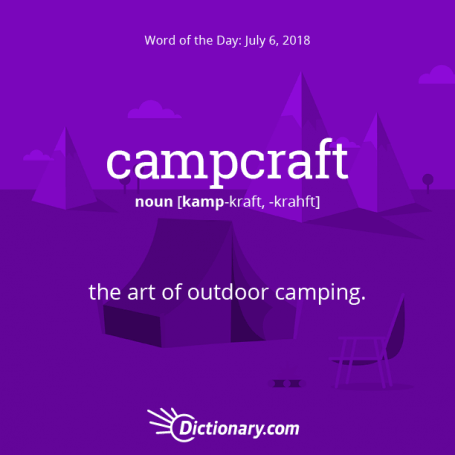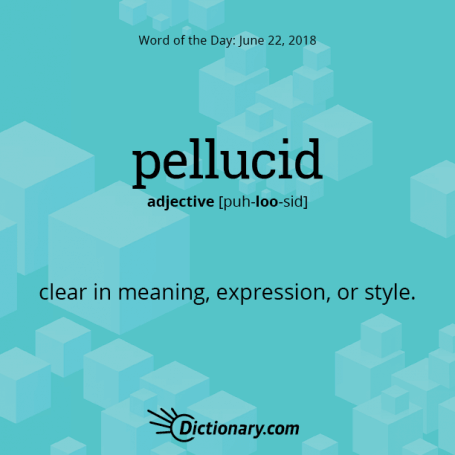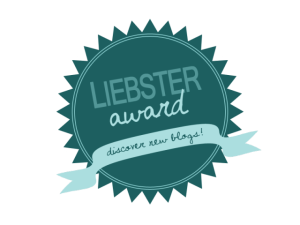
Today’s Word of the Day at Dictionary.com is Campcraft, defined as the “art of outdoor camping”. Okay, I have to stop here for a minute…art? Really!? Can you tell that my brow is furrowed right now? Camping as “art”? I think that’s a stretch. Maybe I should look at other dictionary definitions of the word, campcraft.
But before I do that, let’s look up the word “art”. Wow! What a can of worms that is. Suffice to say that there is an entire field of philosophical study, and a good amount of disagreement regarding art and whether it is even possible to define art; whether anyone should even try. There are pages and pages of methodology and reasoning, but nowhere, NOWHERE do I see any reference to campcrafting. Not a one. It may have something to do with the fact that campcraft is a relatively new word. According to dictionary.com: “Campcraft is a straightforward compound noun. Camp ultimately derives from Latin campus “field, plain,” especially the Campus Martius “the field of Mars” (so called from the altar dedicated to Mars), which was originally pastureland between the Tiber River and the northwest boundary of Rome. The Campus Martius was used for recreation and exercise, various civilian meetings, and army musters and military exercises. Craft is a common Germanic word: cræft in Old English, Kraft in German, kraft in Danish, Norwegian, and Swedish. All of the Germanic languages except English have maintained the original meaning “strength, power”; only English has developed the sense “skill, skilled occupation.” Campcraft entered English in the 20th century.”
But I digress. This is the most neutral, reasonable definition I found for the word “Art”: “the expression or application of human creative skill and imagination, typically in a visual form such as painting or sculpture, producing works to be appreciated primarily for their beauty or emotional power.” See camping in there? uhh hmmm…nope…just as I suggested.
And about those other dictionaries…The Oxford Dictionary says that campcraft is “knowledge and skill required for an outdoor life lacking modern conveniences”. Thank you Oxford Dictionary! Yes! I can relate to this definition. Merriam-Webster says campcraft is “skill and practice in the activities relating to camping”. Wiktionary says campcraft is “Any of the outdoor skills associated with camping expeditions, such as map-reading.” Ah, map reading, and that word again, skill. I get that. It takes a certain amount of skill to survive on limited resources and no creature comforts in the wild, as it were.
I suppose I am a bit biased in my aversion to the idea of camping as art. My latest guilty pleasure has been binge-watching a new reality show on the Discovery Channel called “Naked and Afraid”. Its premise is basically this. Teams (a man and a woman, strangers before the challenge) are dropped off in the wilderness. Each person is allowed to bring a tool of their choice and they are given a square canvas over the shoulder bag…and, ahem, the catch…no clothes allowed. Not a stitch. The object of the game, if you can call it that, is to survive the elements and each other for 40 days, while wandering around with wild animals in some of the world’s most dangerous places. (and we’re not talking about Manhattan here…or Chicago…or our southern border…sorry…not sorry). It’s survival at its rawest. And I can tell you, it’s not pretty. It is extreme campcraft, but is it art? For that I must refer back to the definition of art… “the expression or application of human creative skill (…that word again) and imagination (it certainly takes imagination and skill for these people to figure out how to make it without dying or being eaten by predators), typically in visual form such as painting or sculpture (well…nope, that doesn’t fit), producing works to be appreciated primarily for their beauty or emotional power”. And with that last part, I may just be talking myself out of my first assumption. Survival is not necessarily beautiful to look it. It is pretty messy, in fact, and scary. But now that I think about it, watching these naked people struggling to survive (believe me, it’s hard to not watch, once you’re hooked…and don’t worry, the producers blur out the sensitive anatomic areas, not that it matters, you really get to know the people. That’s what hooks you in.)…watching them take on the challenge is definitely emotionally gripping and inspirational. When I think of art, however one defines what is or isn’t art, there is a common denominator. It causes us to feel something.
So…okay Dictionary.com, I’ll give you the use of the word, art, in your definition. I admit my first thoughts were of bunsen burners, bug spray, flashlights, tents and sleeping bags, lions, tigers and bears…spiders and snakes. In that context, art is a stretch. Even “Glamping” can’t hold a candle to the Mona Lisa. But there is beauty in the skill and creativity of survival. I still like Oxford, Wiktionary, and Merriam-Webster’s definitions, but I get it now. Campcraft can be a beautiful thing. Maybe even art. It’s all in how you perceive it.
campcraft is a skill
in the art of survival
the goal…not dying
~kat













